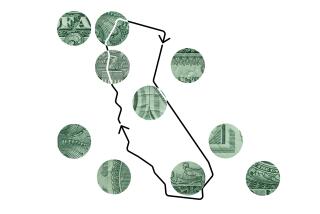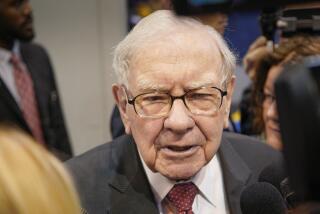Charitable Foundations Benefited From Milken’s ‘Junk Bonds’
- Share via
Financial wizard Michael Milken has become a near-billionaire by pioneering the market for “junk bonds,” an accomplishment that also has him facing allegations of illegal insider trading. At the same time, junk bonds have quietly but enormously expanded the endowment and clout of three charitable foundations that are controlled by Milken and his family.
Since 1982, Milken; his wife, Lori, and other family members have donated $155 million to the Capital Fund Foundation, the M. & L. Milken Foundation and the Milken Family Foundation. The foundations, all in Encino where Milken lives, had combined assets totaling more than $183 million at the end of 1987.
Last year alone, the Milkens donated $93 million in cash and securities to the family’s charitable foundations, according to tax returns and other filings held by the Registry of Charitable Trusts, an arm of the California attorney general’s office. If that sum sounds enormous, consider that Milken’s fortune recently was estimated at $800 million by Forbes magazine.
Even in earlier years, Milken’s donations were sizable. On one day, Dec. 30, 1985, Milken and his wife turned over $23 million in cash and $7.8 million in securities to the Capital Fund Foundation.
The foundations, in turn, have disbursed more than $13 million in donations to some 200 organizations over the past five years, ranging from the Stephen S. Wise Temple in Los Angeles ($2.1 million), where the Milkens attend, to the universities of California and Pennsylvania ($1.6 million combined), where Milken studied finance.
Although the $13 million is dwarfed by the foundations’ total assets, it easily meets the annual minimum payout that regulators require private charitable foundations to make, which is 5% of total investment assets.
And much of the foundations’ remaining money is invested in junk bonds, the high-yield, high-risk debt securities that Milken, 42, and his employer, investment firm Drexel Burnham Lambert, turned into vehicles for raising huge amounts of cash for takeovers and other corporate uses over the past decade.
The popularity of junk bonds made Milken and his firm famous, yet the former high school cheerleader has shunned the limelight and is renowned for spending long hours at his office in Beverly Hills and the rest of his time with his family. Milken’s charitable giving has been largely unheralded.
In recent months, however, he has become more accessible, particularly to promote causes to which he is attached.
Milken spokesman Kenneth Lerer said Milken and other family members “get extremely involved in the charities and try to help out as much as they can after they give the money.”
Milken himself was unavailable for comment Wednesday because he was flying to Chicago to attend a program honoring Illinois educators, who will receive cash awards funded by Milken’s foundations, Lerer said. A similar program in California awarded $300,000 to 12 educators this year.
Indeed, about 40% of the foundations’ annual donations go toward education, Lerer said. Another 20% is earmarked for health care and medical research; 19% goes to community organizations, and 17% is aimed at human welfare services. The remaining 4% goes to other causes.
Big recipients of Milken’s donations include the Jewish Federation Council of Greater Los Angeles, which has received more than $1.5 million in recent years. The council channels money to several social services from day care to medical clinics, some of which are housed in the Bernard Milken Jewish Community Campus in West Hills near Canoga Park.
The campus, named after Milken’s late father, an accountant, opened a year ago at a cost of $12 million, $5 million of which was donated by the Milken family. Michael Milken and other family members frequently visit the campus, said Ron Rieder, spokesman for the Jewish Federation Council.
Milken “has expressed interest in what programs are going on and what programs are planned,” Rieder said.
Other recipients of Milken’s money include Mothers Against Drunk Driving, the American Civil Liberties Union, the Los Angeles Children’s Museum, the Dana-Farber Cancer Institute, People Assisting the Homeless and the National Indian Youth Council.
Seen as Good Investments
But although Milken is actively involved in many of the organizations that receive his money, he does not actively trade stocks and bonds with his foundations’ funds, Lerer said. “Michael is totally passive on the investment decisions,” which are handled by Century Institutional Advisors in Beverly Hills.
So why are the foundations deeply into junk bonds? “The foundations’ portfolio obviously reflects what Michael overall believes are good investments--high-yield securities,” Lerer said.
Junk bonds traded by Milken’s Capital Fund Foundation in the past two years have included those issued by Revlon Group, First Executive Corp., Metromedia and BCI Holdings. The Capital Fund Foundation alone in 1987 earned dividends and interest from its securities of $11.3 million.
Milken’s seemingly higher profile in recent months has led to suggestions that he is trying to offset negative publicity stemming from Wall Street’s insider trading scandal, which first erupted in late 1986. Last month, the Securities and Exchange Commission filed a civil suit alleging that Milken, Drexel and others violated securities laws that prohibit illegal insider trading. Milken and Drexel have denied any wrongdoing.
Just as Milken’s public appearances seem to have increased recently, so have his donations to his charitable foundations. His family’s contributions went from about $30 million in each of 1985 and 1986 to $93 million last year.
Not Seeking Publicity
But Lerer denied that there was any connection between Milken’s increased donations and the growing scandal. He noted, for instance, that in 1985--before the scandal erupted--the Milken family’s contributions soared more than sevenfold to $30 million from $4 million the previous year.
“Clearly, the family had a major financial commitment to charity before late-1986, and they simply continued that involvement to the present date,” said Lerer, who also contended that Milken’s public appearances haven’t increased significantly. “They didn’t seek publicity for this before, and they’re not seeking publicity now.”
MILKEN FOUNDATIONS AT A GLANCE Michael Milken and his family have donated more than $155 million to three charitable foundations they have set up since 1982: The Capital Fund Foundation, the M. and L. Milken Foundation, and the Milken Family Foundation. Tables show the Milken family’s donations to the three foundations, the foundations’ yearly payments to charities and the size of the foundations’ assets. All for fiscal years ended Nov. 30 Milken Family Donations to Foundations 1987 $92,900,000 1986 30,900,000 1985 30,200,000 1984 4,000,000 1983 500,000 1982 500,000 Foundations’ Payments to Charities 1987 $10,800,000 1986 2,035,000 1985 561,000 1984 207,000 1983 49,000 1982 25,000 Market Value of Foundations’ Assets* 1987 $183,400,000 1986 94,800,000 1985 43,900,000 1984 5,600,000 1983 1,200,000 1982 500,000 *At year-end Source: State Registry of Charitable Trusts MILKEN FOUNDATIONS’ PET CHARITIES Contributions from 1984 through Nov. 30, 1987 Stephen S. Wise Temple $2,092,358 Jewish Federation Council 1,550,000 University of Pennsylvania 1,056,000 United Jewish Welfare Fund 1,290,100 Dana-Farber Cancer Institute 800,000 Regents of University of California 750,000 UC Berkeley 525,000 Brentwood School 525,000 Valley Beth Shalom Temple 250,000 Downtown Women’s Center 240,000 Simon Wiesenthal Center 200,000
More to Read
Inside the business of entertainment
The Wide Shot brings you news, analysis and insights on everything from streaming wars to production — and what it all means for the future.
You may occasionally receive promotional content from the Los Angeles Times.











